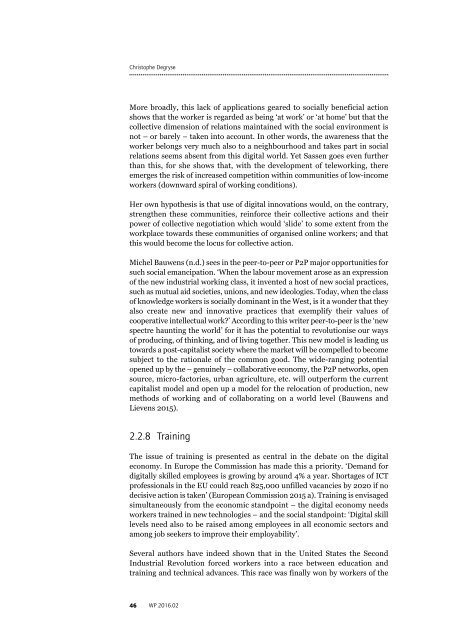Digitalisation of the economy and its impact on labour markets —
ver+2+web+version+Working+Paper+2016+02-EN+digitalisation
ver+2+web+version+Working+Paper+2016+02-EN+digitalisation
Create successful ePaper yourself
Turn your PDF publications into a flip-book with our unique Google optimized e-Paper software.
Christophe Degryse<br />
More broadly, this lack <str<strong>on</strong>g>of</str<strong>on</strong>g> applicati<strong>on</strong>s geared to socially beneficial acti<strong>on</strong><br />
shows that <str<strong>on</strong>g>the</str<strong>on</strong>g> worker is regarded as being ‘at work’ or ‘at home’ but that <str<strong>on</strong>g>the</str<strong>on</strong>g><br />
collective dimensi<strong>on</strong> <str<strong>on</strong>g>of</str<strong>on</strong>g> relati<strong>on</strong>s maintained with <str<strong>on</strong>g>the</str<strong>on</strong>g> social envir<strong>on</strong>ment is<br />
not – or barely – taken into account. In o<str<strong>on</strong>g>the</str<strong>on</strong>g>r words, <str<strong>on</strong>g>the</str<strong>on</strong>g> awareness that <str<strong>on</strong>g>the</str<strong>on</strong>g><br />
worker bel<strong>on</strong>gs very much also to a neighbourhood <str<strong>on</strong>g>and</str<strong>on</strong>g> takes part in social<br />
relati<strong>on</strong>s seems absent from this digital world. Yet Sassen goes even fur<str<strong>on</strong>g>the</str<strong>on</strong>g>r<br />
than this, for she shows that, with <str<strong>on</strong>g>the</str<strong>on</strong>g> development <str<strong>on</strong>g>of</str<strong>on</strong>g> teleworking, <str<strong>on</strong>g>the</str<strong>on</strong>g>re<br />
emerges <str<strong>on</strong>g>the</str<strong>on</strong>g> risk <str<strong>on</strong>g>of</str<strong>on</strong>g> increased competiti<strong>on</strong> within communities <str<strong>on</strong>g>of</str<strong>on</strong>g> low-income<br />
workers (downward spiral <str<strong>on</strong>g>of</str<strong>on</strong>g> working c<strong>on</strong>diti<strong>on</strong>s).<br />
Her own hypo<str<strong>on</strong>g>the</str<strong>on</strong>g>sis is that use <str<strong>on</strong>g>of</str<strong>on</strong>g> digital innovati<strong>on</strong>s would, <strong>on</strong> <str<strong>on</strong>g>the</str<strong>on</strong>g> c<strong>on</strong>trary,<br />
streng<str<strong>on</strong>g>the</str<strong>on</strong>g>n <str<strong>on</strong>g>the</str<strong>on</strong>g>se communities, reinforce <str<strong>on</strong>g>the</str<strong>on</strong>g>ir collective acti<strong>on</strong>s <str<strong>on</strong>g>and</str<strong>on</strong>g> <str<strong>on</strong>g>the</str<strong>on</strong>g>ir<br />
power <str<strong>on</strong>g>of</str<strong>on</strong>g> collective negotiati<strong>on</strong> which would ‘slide’ to some extent from <str<strong>on</strong>g>the</str<strong>on</strong>g><br />
workplace towards <str<strong>on</strong>g>the</str<strong>on</strong>g>se communities <str<strong>on</strong>g>of</str<strong>on</strong>g> organised <strong>on</strong>line workers; <str<strong>on</strong>g>and</str<strong>on</strong>g> that<br />
this would become <str<strong>on</strong>g>the</str<strong>on</strong>g> locus for collective acti<strong>on</strong>.<br />
Michel Bauwens (n.d.) sees in <str<strong>on</strong>g>the</str<strong>on</strong>g> peer-to-peer or P2P major opportunities for<br />
such social emancipati<strong>on</strong>. ‘When <str<strong>on</strong>g>the</str<strong>on</strong>g> <strong>labour</strong> movement arose as an expressi<strong>on</strong><br />
<str<strong>on</strong>g>of</str<strong>on</strong>g> <str<strong>on</strong>g>the</str<strong>on</strong>g> new industrial working class, it invented a host <str<strong>on</strong>g>of</str<strong>on</strong>g> new social practices,<br />
such as mutual aid societies, uni<strong>on</strong>s, <str<strong>on</strong>g>and</str<strong>on</strong>g> new ideologies. Today, when <str<strong>on</strong>g>the</str<strong>on</strong>g> class<br />
<str<strong>on</strong>g>of</str<strong>on</strong>g> knowledge workers is socially dominant in <str<strong>on</strong>g>the</str<strong>on</strong>g> West, is it a w<strong>on</strong>der that <str<strong>on</strong>g>the</str<strong>on</strong>g>y<br />
also create new <str<strong>on</strong>g>and</str<strong>on</strong>g> innovative practices that exemplify <str<strong>on</strong>g>the</str<strong>on</strong>g>ir values <str<strong>on</strong>g>of</str<strong>on</strong>g><br />
cooperative intellectual work?’ According to this writer peer-to-peer is <str<strong>on</strong>g>the</str<strong>on</strong>g> ‘new<br />
spectre haunting <str<strong>on</strong>g>the</str<strong>on</strong>g> world’ for it has <str<strong>on</strong>g>the</str<strong>on</strong>g> potential to revoluti<strong>on</strong>ise our ways<br />
<str<strong>on</strong>g>of</str<strong>on</strong>g> producing, <str<strong>on</strong>g>of</str<strong>on</strong>g> thinking, <str<strong>on</strong>g>and</str<strong>on</strong>g> <str<strong>on</strong>g>of</str<strong>on</strong>g> living toge<str<strong>on</strong>g>the</str<strong>on</strong>g>r. This new model is leading us<br />
towards a post-capitalist society where <str<strong>on</strong>g>the</str<strong>on</strong>g> market will be compelled to become<br />
subject to <str<strong>on</strong>g>the</str<strong>on</strong>g> rati<strong>on</strong>ale <str<strong>on</strong>g>of</str<strong>on</strong>g> <str<strong>on</strong>g>the</str<strong>on</strong>g> comm<strong>on</strong> good. The wide-ranging potential<br />
opened up by <str<strong>on</strong>g>the</str<strong>on</strong>g> – genuinely – collaborative <str<strong>on</strong>g>ec<strong>on</strong>omy</str<strong>on</strong>g>, <str<strong>on</strong>g>the</str<strong>on</strong>g> P2P networks, open<br />
source, micro-factories, urban agriculture, etc. will outperform <str<strong>on</strong>g>the</str<strong>on</strong>g> current<br />
capitalist model <str<strong>on</strong>g>and</str<strong>on</strong>g> open up a model for <str<strong>on</strong>g>the</str<strong>on</strong>g> relocati<strong>on</strong> <str<strong>on</strong>g>of</str<strong>on</strong>g> producti<strong>on</strong>, new<br />
methods <str<strong>on</strong>g>of</str<strong>on</strong>g> working <str<strong>on</strong>g>and</str<strong>on</strong>g> <str<strong>on</strong>g>of</str<strong>on</strong>g> collaborating <strong>on</strong> a world level (Bauwens <str<strong>on</strong>g>and</str<strong>on</strong>g><br />
Lievens 2015).<br />
2.2.8 Training<br />
The issue <str<strong>on</strong>g>of</str<strong>on</strong>g> training is presented as central in <str<strong>on</strong>g>the</str<strong>on</strong>g> debate <strong>on</strong> <str<strong>on</strong>g>the</str<strong>on</strong>g> digital<br />
<str<strong>on</strong>g>ec<strong>on</strong>omy</str<strong>on</strong>g>. In Europe <str<strong>on</strong>g>the</str<strong>on</strong>g> Commissi<strong>on</strong> has made this a priority. ‘Dem<str<strong>on</strong>g>and</str<strong>on</strong>g> for<br />
digitally skilled employees is growing by around 4% a year. Shortages <str<strong>on</strong>g>of</str<strong>on</strong>g> ICT<br />
pr<str<strong>on</strong>g>of</str<strong>on</strong>g>essi<strong>on</strong>als in <str<strong>on</strong>g>the</str<strong>on</strong>g> EU could reach 825,000 unfilled vacancies by 2020 if no<br />
decisive acti<strong>on</strong> is taken’ (European Commissi<strong>on</strong> 2015 a). Training is envisaged<br />
simultaneously from <str<strong>on</strong>g>the</str<strong>on</strong>g> ec<strong>on</strong>omic st<str<strong>on</strong>g>and</str<strong>on</strong>g>point – <str<strong>on</strong>g>the</str<strong>on</strong>g> digital <str<strong>on</strong>g>ec<strong>on</strong>omy</str<strong>on</strong>g> needs<br />
workers trained in new technologies – <str<strong>on</strong>g>and</str<strong>on</strong>g> <str<strong>on</strong>g>the</str<strong>on</strong>g> social st<str<strong>on</strong>g>and</str<strong>on</strong>g>point: ‘Digital skill<br />
levels need also to be raised am<strong>on</strong>g employees in all ec<strong>on</strong>omic sectors <str<strong>on</strong>g>and</str<strong>on</strong>g><br />
am<strong>on</strong>g job seekers to improve <str<strong>on</strong>g>the</str<strong>on</strong>g>ir employability’.<br />
Several authors have indeed shown that in <str<strong>on</strong>g>the</str<strong>on</strong>g> United States <str<strong>on</strong>g>the</str<strong>on</strong>g> Sec<strong>on</strong>d<br />
Industrial Revoluti<strong>on</strong> forced workers into a race between educati<strong>on</strong> <str<strong>on</strong>g>and</str<strong>on</strong>g><br />
training <str<strong>on</strong>g>and</str<strong>on</strong>g> technical advances. This race was finally w<strong>on</strong> by workers <str<strong>on</strong>g>of</str<strong>on</strong>g> <str<strong>on</strong>g>the</str<strong>on</strong>g><br />
46 WP 2016.02


